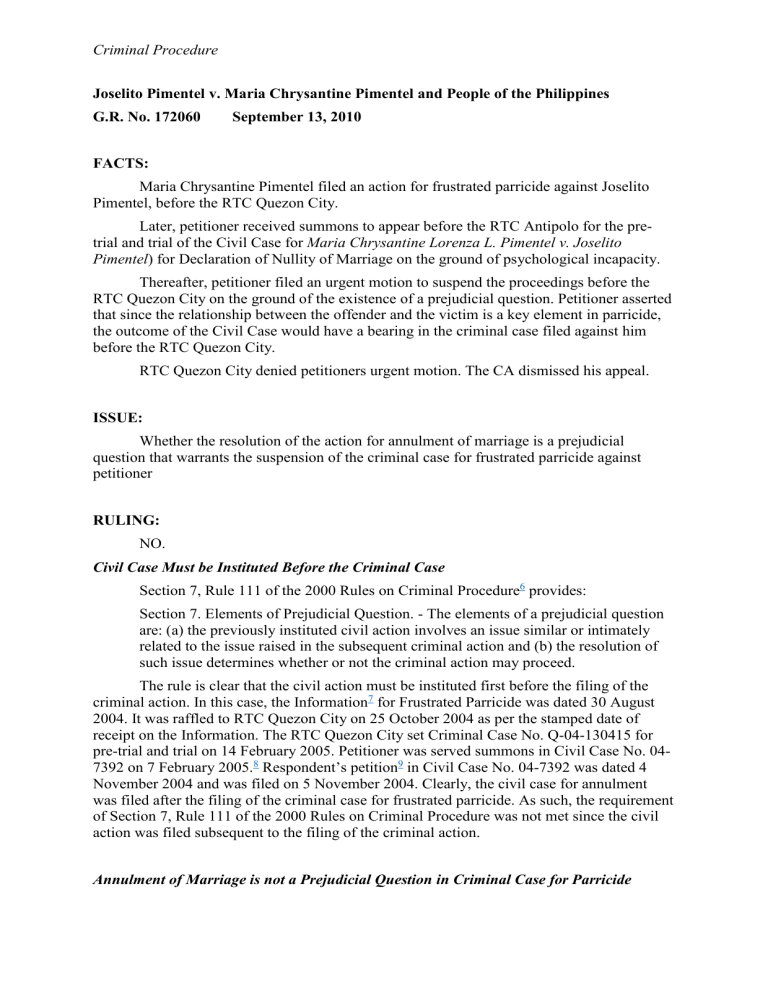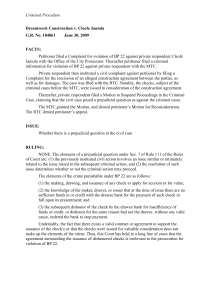
Criminal Procedure Joselito Pimentel v. Maria Chrysantine Pimentel and People of the Philippines G.R. No. 172060 September 13, 2010 FACTS: Maria Chrysantine Pimentel filed an action for frustrated parricide against Joselito Pimentel, before the RTC Quezon City. Later, petitioner received summons to appear before the RTC Antipolo for the pretrial and trial of the Civil Case for Maria Chrysantine Lorenza L. Pimentel v. Joselito Pimentel) for Declaration of Nullity of Marriage on the ground of psychological incapacity. Thereafter, petitioner filed an urgent motion to suspend the proceedings before the RTC Quezon City on the ground of the existence of a prejudicial question. Petitioner asserted that since the relationship between the offender and the victim is a key element in parricide, the outcome of the Civil Case would have a bearing in the criminal case filed against him before the RTC Quezon City. RTC Quezon City denied petitioners urgent motion. The CA dismissed his appeal. ISSUE: Whether the resolution of the action for annulment of marriage is a prejudicial question that warrants the suspension of the criminal case for frustrated parricide against petitioner RULING: NO. Civil Case Must be Instituted Before the Criminal Case Section 7, Rule 111 of the 2000 Rules on Criminal Procedure6 provides: Section 7. Elements of Prejudicial Question. - The elements of a prejudicial question are: (a) the previously instituted civil action involves an issue similar or intimately related to the issue raised in the subsequent criminal action and (b) the resolution of such issue determines whether or not the criminal action may proceed. The rule is clear that the civil action must be instituted first before the filing of the criminal action. In this case, the Information7 for Frustrated Parricide was dated 30 August 2004. It was raffled to RTC Quezon City on 25 October 2004 as per the stamped date of receipt on the Information. The RTC Quezon City set Criminal Case No. Q-04-130415 for pre-trial and trial on 14 February 2005. Petitioner was served summons in Civil Case No. 047392 on 7 February 2005.8 Respondent’s petition9 in Civil Case No. 04-7392 was dated 4 November 2004 and was filed on 5 November 2004. Clearly, the civil case for annulment was filed after the filing of the criminal case for frustrated parricide. As such, the requirement of Section 7, Rule 111 of the 2000 Rules on Criminal Procedure was not met since the civil action was filed subsequent to the filing of the criminal action. Annulment of Marriage is not a Prejudicial Question in Criminal Case for Parricide Criminal Procedure Further, the resolution of the civil action is not a prejudicial question that would warrant the suspension of the criminal action. There is a prejudicial question when a civil action and a criminal action are both pending, and there exists in the civil action an issue which must be preemptively resolved before the criminal action may proceed because howsoever the issue raised in the civil action is resolved would be determinative of the guilt or innocence of the accused in the criminal case.10 A prejudicial question is defined as: x x x one that arises in a case the resolution of which is a logical antecedent of the issue involved therein, and the cognizance of which pertains to another tribunal. It is a question based on a fact distinct and separate from the crime but so intimately connected with it that it determines the guilt or innocence of the accused, and for it to suspend the criminal action, it must appear not only that said case involves facts intimately related to those upon which the criminal prosecution would be based but also that in the resolution of the issue or issues raised in the civil case, the guilt or innocence of the accused would necessarily be determined. The relationship between the offender and the victim is a key element in the crime of parricide, which punishes any person "who shall kill his father, mother, or child, whether legitimate or illegitimate, or any of his ascendants or descendants, or his spouse." The relationship between the offender and the victim distinguishes the crime of parricide from murder or homicide. However, the issue in the annulment of marriage is not similar or intimately related to the issue in the criminal case for parricide. Further, the relationship between the offender and the victim is not determinative of the guilt or innocence of the accused. The issue in the civil case for annulment of marriage under Article 36 of the Family Code is whether petitioner is psychologically incapacitated to comply with the essential marital obligations. The issue in parricide is whether the accused killed the victim. In this case, since petitioner was charged with frustrated parricide, the issue is whether he performed all the acts of execution which would have killed respondent as a consequence but which, nevertheless, did not produce it by reason of causes independent of petitioner’s will. At the time of the commission of the alleged crime, petitioner and respondent were married. The subsequent dissolution of their marriage, in case the petition in Civil Case is granted, will have no effect on the alleged crime that was committed at the time of the subsistence of the marriage. In short, even if the marriage between petitioner and respondent is annulled, petitioner could still be held criminally liable since at the time of the commission of the alleged crime, he was still married to respondent.

